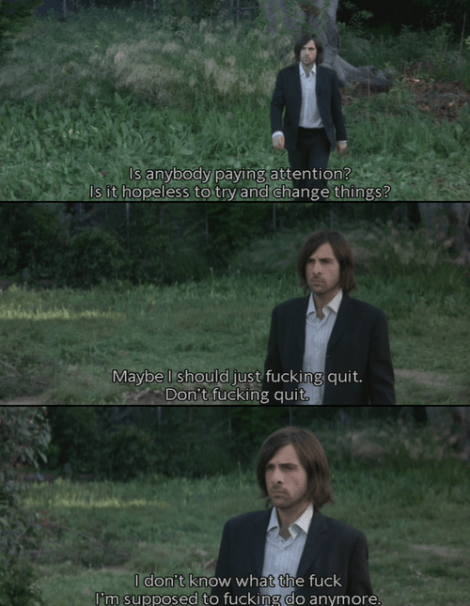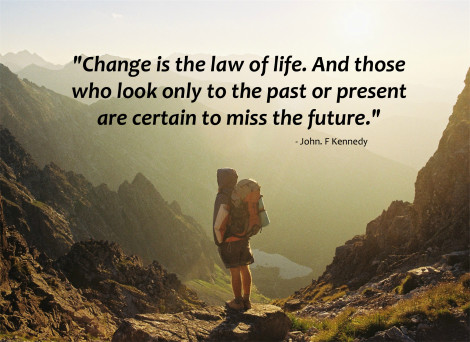
It could be triggered by something small, like a strange coincidence, by general life malaise or by a serious personal or professional disappointment which causes you to begin to question everything.
Ask 5 friends today whether they have experienced some form of existential angst in the past 12 months and at least 3 will answer ‘yes’ (if you are reading this, you probably answered ‘yes’ too).
Overthinking personal or career problems, feeling overwhelmed, anxious, depressed and stressed for protracted periods of time is a common affliction for young Australians. Second-guessing our past decisions, questioning our current circumstances, and striving to forecast our futures are some of the main factors contributing to an outbreak of what we’re describing as ‘millennial life fright.’
Why are many millennial Australians experiencing a spike in early life crises?
Perhaps more than preceding generations, Gen Y Australians are cripplingly conscious of our limitations and our own mortality.
We understand that life is finite and there is no time to waste, leaving us prone to setting ambitious, and sometimes unrealistic, goals. We make mental layer cakes formed of equal parts hope, ambition, pressure and expectation.

Our hopes and dreams
But when these dreams fail to materialise on our abstract mental timeline, we go to water.
Rather than taking small setbacks in our stride by taking a beat, re-thinking, re-grouping, and re-jigging our plans, we can sometimes be susceptible to catastrophising the situation. For example:
I didn’t get the job, so I’m never going to be able to get a job ever and will never amount to anything. I’m going to be a deadbeat loser my entire life with no career, no hope and no prospects.”
The main byproduct of this deeply ingrained generational proclivity for disappointment and self-loathing is ongoing levels of anxiety, stress, and depression.
What our unusually cruel internal dialogue tells us is that the only logical reason why things have not worked out according to our original watertight plan is because we are impossible failures. Our friends or classmates will go on to enjoy wild success and enviable accomplishments, while we sit and ruminate in an unbearable pit of despair.
Somewhat counterintuitively, the more we tend to experience these anxious and negative thoughts, the more we try to convince our wider social media networks that we are leading full, happy and successful lives.
The result is a digital vortex that pulls millions of unwitting and increasingly dissatisfied young Australians into its murky depths.
Social media is the carrier, self-doubt is the virus
Social media is a place where everyone is having the best day of their life every single day.

The fact that these platforms feed us a curated ‘highlight reel’ is not lost on most millennials. It does, however, still succeed in generating overwhelming feelings of inferiority at times.
We are all guilty of looking at what our peers are doing – whether in the form of kicking career goals, travelling the world, buying a new house, getting married or having a baby – and comparing their success to our lives, thereby questioning our own journey and achievements:
Who am I? What am I doing with my life? Should I be doing more?”
More often than not we leave social media networks feeling as though we have simultaneously been punched in the solar plexus and are coming down with a hideous virus.
But self-doubt and disenchantment have become psychological viruses of sorts. They have not only found their perfect breeding ground in social media’s fragile and narcissistic ‘ego-system’, but are also capable of using these digital environments to spread through Newsfeeds, multiply exponentially, and infect millions of unsuspecting users daily.
These viruses of doubt quickly infect our subconscious and warp how we see ourselves.
It is a painful process that often makes us realise the ways in which our actual self differs from our ideal self. This is a major source of anxiety for many Gen Y.
Social media lives seem real. But rather than doubt the legitimacy of our friends’ digital world, we doubt the legitimacy of our own.
Viral content, like Prince Ea’s motivational video below, for example, are brilliantly inspiring but they also contribute to lingering questions about whether we are missing something or should be doing more.
They make us feel as though if we are not doing or achieving something significant every day that we have, in some way, failed to live a full life.
My personal experience with self-doubt is consistent with this. I graduated with a Bachelor of Laws/Bachelor of Psychological Science in May 2016. Since then, it feels as though all I have managed to accomplish with my degree is successfully appeal a parking ticket. I have so much ambition and when asked ‘whether I am going to use my degrees’ I am reminded of the disparity between who I am, who I want to be, and the steps I am taking (or not taking) to get there.
Social media only exacerbates this anxiety and self-doubt. I am constantly reminded that others my age seem to have it all figured out. I look at what they are doing and feel flawed, doubtful and inferior.
Like many other young Australians, I am left wondering ‘What am I doing wrong?’
Causes of common career crises
Through work, we are searching “for a sort of life rather than a Monday through Friday sort of dying” – Studs Terkel

Daily internal dialogue
You may absolutely love studying your degree – but will it ultimately lead you down a career path that you are equally passionate about?
You might adore your job – but is it something you can see yourself staying in for five, ten or even twenty years?
The reason many of us become ensnared in paralysing worry and self-doubt about our occupational choices is that we have a habit of blurring the lines between a job, a career, and a calling.
We needlessly worry about selling out, selling ourselves short and becoming inauthentic versions of ourselves.
In her book, Simple Abundance, Sarah Ban Breathnach distinguishes between three categories of work and attributes much existential suffering to those who are searching for a calling, not a job.

- A job is something that is a means to an end. It pays the bills and may be a temporary position that tides you over as you search for something else. For example, casual hospitality work.
2. A career is something you usually study for and unfolds according to a clear occupational path. For example, legal, advertising, medicine, engineering, accounting, publishing. It generally pays well and has security and predictability. But it may not bring you passion, help you to sleep peacefully or fulfil a deeper purpose in your life.
3. A calling is that gnawing feeling in the pit of your stomach. It is the idea that keeps you awake at night. It is why you get excited to get up every morning. It may not pay well, in fact, it may not pay anything at all. But it is something you feel that you are meant to do because it uses your unique skill set to fulfil a higher purpose which brings you peace, fulfilment, authentic happiness and meaning.
Your career may well be your calling. Or you may have a career but find that you are still searching for your calling. The search for meaning is, perhaps, why many of us are pursuing creative passions in the form of entrepreneurial ventures or side projects built around full-time work.
How to handle inevitable existential distress
It is easy to regard self-doubt and anxiety as uniformly negative emotions. But, when handled correctly, engaging in deep thinking about different stages of your life can be a powerful and positive exercise. It means you have a sound idea about your life goals and that you are not willing to settle.
- Write down your goals.
Try to break them down into bite-sized and manageable segments. Do you want to be running your own business in 5 years time? You can start by gaining industry knowledge and experience by working in a similar startup. When you do decide to launch your business, you will be able to do so from a solid foundation.
Importantly, celebrate everyday triumphs. Never underestimate small, or seemingly insignificant, accomplishments. Every win has brought you one step closer to achieving your dream than you were yesterday.
- Be mindful
Practising mindfulness means spending time appreciating your life as it is right now, without judgment.

If it has become a source of anxiety, take a step back from social media and other negative influences or people in your life. Consciously removing yourself from unrealistic external sources of pressure and negativity limits their power to influence you and your overall happiness.
As a start, experiment with great apps, such as Headspace, which coach you through effective strategies to meditate and to exercise mindfulness everyday.
Monash University also runs free online courses on Mindfulness for Wellbeing and Peak Performance.
- Talk to someone
There is an excellent chance that your friends are feeling, or have felt, the same way you are right now.
Remember that nobody goes through life at the same pace, and not everyone wants to achieve the same things that you do. This means that it is impossible to compare your life with somebody else’s and to expect similar results.
When it comes to millennial Australians, the reality is that we are not following the same well-worn path as our predecessors, or our contemporaries. Our personal and professional timelines are not linear.
The key to minimising the impact of an existential crisis, then, is to appreciate what you have now while working towards what you want. If you already know what you value and where you intend to go in life, then you are already a success.
The good news?
The best part about having an existential crisis is the dawning realisation that you don’t have to figure everything out right now.An existential crisis just means that you are questioning ideas and challenging the status quo, whether in your own life or a broader social context, and this is a sign of a healthy mind that is engaged with life.
One of the simultaneously exquisite and excruciating parts of life is that your true path will only emerge at a time and place when you are ready to receive it.
In the meantime, keep dreaming, keep seeking and keep believing.
 Agree? Get informed about legal change that impacts you with our newsletter. You'll automatically receive fresh content each time we publish.
Agree? Get informed about legal change that impacts you with our newsletter. You'll automatically receive fresh content each time we publish.